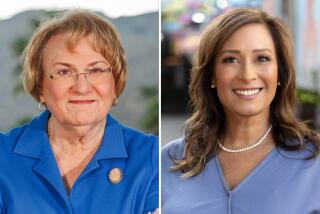2 Seek Top Voter Post
- Share via
With just a few weeks to go before Californians vote in the June 6 primary, two termed-out legislators hope to reclaim the state’s top elections office for Democrats.
State Sens. Debra Bowen (D-Marina del Rey) and Deborah Ortiz (D-Sacramento) are running for secretary of state with the hope of challenging the incumbent, Republican Bruce McPherson, who was appointed by the governor.
For the record:
12:00 a.m. June 23, 2006 For The Record
Los Angeles Times Friday June 23, 2006 Home Edition Main News Part A Page 2 National Desk 2 inches; 76 words Type of Material: Correction
Secretary of state: An article in the May 14 California section on two Democrats running for secretary of state indicated that a member of incumbent Bruce McPherson’s transition team in 2005, a former deputy secretary of state, became a member of the lobbying firm representing electronic voting system manufacturer Diebold Inc. According to the firm, GCG Rose and Kindel, Adan Ortega Jr. was an independent subcontractor when he worked for McPherson and later became an employee.
McPherson, running unopposed in the primary, got the job last year after Democrat Kevin Shelley, elected in 2002, resigned amid investigations into campaign fundraising and his office’s use of federal election money.
Neither Bowen nor Ortiz -- or McPherson, for that matter -- is well-known statewide. In a recent Field Poll gauging public interest in state races, six in 10 voters said they had no idea whom they would choose for secretary of state, and most had no opinion on the candidates.
Both Bowen and Ortiz are known in Sacramento, however: Bowen for her aggressive protection of privacy and voting rights, and Ortiz as a leading voice for healthcare and public accountability with the state’s $3-billion stem cell research bond.
Ortiz said her vision is to fashion the secretary of state’s office into a public watchdog for voting rights. In the Senate, she has favored more enforcement money for the state Fair Political Practices Commission, which investigates campaign finance complaints and has been underfunded for years.
She supports eventual public financing of campaigns to reduce the need for legislators to raise money -- a position Bowen shares.
“I want to use the office to inspire people to vote and to rebuild a lot of the relationships that have been harmed extremely under Kevin Shelley,” Ortiz said, adding that many county registrars have complained of tensions with the office over deadlines to install new voting machines.
It is more important to rebuild bridges, she said, than “create fear and distrust of our democratic process” -- a swipe at Bowen’s recent hearings as chairwoman of the Senate Elections Committee highlighting problems with electronic voting systems.
Ortiz favors exploring ways to make voting easier to encourage greater participation, including centralized polling places so voters can cast ballots near work and more opportunities to cast ballots by mail.
“There’s a segment of people who haven’t connected with the electoral process,” she said. “It forces us to ask whether residential-based polling places fit society today. It might be better to, say, have major voting centers in a city adjacent to major transportation centers.”
She said McPherson has been too restrictive in drafting regulations for voters registering under new federal identification requirements. As many as 40% of new registrants in Los Angeles County risk not being cleared in time to vote in June.
Ortiz, 49, has spent her adult life in public service, working several staff jobs at the Capitol before being the first Latina elected to the Sacramento City Council. She served from 1993 to 1996, when she was elected to the Assembly. She served one term, then was elected to the Senate.
Ortiz has focused much of her legislative effort on healthcare and heads the Senate Health Committee. She spent nearly $500,000 and a significant chunk of 2005 preparing to run for state insurance commissioner before jumping to the secretary of state race.
In April, Gov. Arnold Schwarzenegger backed her plan to establish a department of public health to focus on outbreaks of disease and food poisoning and to oversee the care of 100,000 people living in nursing homes. The bill also called for restructuring the California Department of Health Services.
Last year, Schwarzenegger signed an Ortiz bill requiring pharmacists to fill prescriptions such as morning-after birth control pills even if they have moral objections. A separate bill bars hospitals from charging uninsured patients more than they charge Medicaid and Medicare for the same treatment.
A leader on legislative oversight of stem cell research money, Ortiz wants the recipients of all stem cell grants or loans to share half of their net licensing revenue with the state if the state shared the expense of developing or protecting their patents. The share would be 25% if a patent was developed without state funds.
“Throughout my career, I have not cowered to special interests,” she said in a “why-I’m-running” statement. “I have stood by policies that I believe are in the best interest of Californians. This is the spirit I will take with me to the secretary of state’s office.”
Bowen has been the most vocal in challenging McPherson, a moderate former legislator from Santa Cruz whom many lauded for restoring credibility to the office after Shelley’s departure. Bowen, 50, launched her campaign eight months before Ortiz, after considering runs for state attorney general and controller.
Bowen has used her position as chairwoman of the Senate Elections Committee to castigate McPherson for certifying potentially faulty voting systems vulnerable to hacking, and for, in her view, dragging his feet on reinstating thousands of voters who inadvertently left identifying information off their registration forms.
She is carrying a bill to outlaw so-called bounty programs, in which petition and voter registration solicitors are paid for each signature, and another that would require initiative petition circulators to declare who is paying for their signature-gathering effort.
Last month, Bowen easily won the state Democratic Party endorsement after she and Ortiz addressed delegates at a party convention.
It is that endorsement, plus listings on several statewide slate cards, that Bowen is counting on to appeal to voters in coming weeks. Her campaign has been run mostly through the Internet and an extensive website that has attracted thousands of grass-roots volunteers to a race with nearly zero visibility.
Far from being merely a ministerial post, she said, the job of top elections official is perhaps the most important race in any state.
“Before Florida and Ohio, no one really understood how it all worked,” she said. “Between [former Florida elections chief] Katherine Harris and watching the TV coverage of hanging chads, I think people have a general sense that things aren’t quite as tidy and buttoned-up as you’d hope they would be for something so critical to democracy.”
McPherson’s critics have accused him of taking too long to deal with a series of security breaches and software problems arising from the hurried purchase of electronic voting systems by counties throughout California to comply with federal voting requirements. The risk is that eligible voters will be disenfranchised and vote results compromised, Bowen said.
Vote-recording memory cards “can fit in someone’s pocket,” she said, describing the security danger posed by the palm-sized cards. “The way things are now, you can’t swap 700 paper ballots for a different stack of 700 ballots.”
She also has been critical of McPherson’s decision to certify electronic voting systems made by Ohio-based Diebold Election Systems that were shown to be vulnerable to tampering. McPherson’s advisory team included Adan Ortega Jr., a former deputy secretary of state who became a member of the lobbying firm that represents Diebold.
Bowen first became politically active when volunteering for her community’s Neighborhood Watch. She was elected to the Assembly in 1992 and the Senate in 1998.
Among her legislative achievements: In 2001, the state enacted her bill restricting access to Social Security numbers, including barring healthcare cards from listing such numbers as identifiers.
Another successful Bowen bill required credit card companies to notify consumers of any security breach in personal information. An advocate of open government, she also has written several bills giving Californians electronic access to public records.
As of March 17, the latest for which reports are available, Bowen had spent $200,000 since Jan. 1 and had $322,000 in cash on hand.
Ortiz had raised $46,000 this year and spent $81,000. She had cash on hand of $384,000.
*
(BEGIN TEXT OF INFOBOX)
The candidates
Debra Bowen
Party: Democratic
Occupation: State senator
Age: 50; born in Rockford, Ill.
Residence: Marina del Rey
Personal: Married, one daughter and one stepdaughter
Education: Communications degree from Michigan State University, 1976; law degree from University of Virginia, 1979
Career highlights: Elected to state Assembly, 1992; elected to state Senate, 1998
Platform: Establish auditing requirements for all voting equipment; restore eligibility to thousands of disenfranchised voters; require initiative signature-gatherers to disclose who is paying them; improve access to information on political donors; increase participation in elections and poll-worker training
*
Deborah Ortiz
Party: Democratic
Occupation: State senator
Age: 49; born in Sacramento
Residence: Sacramento
Personal: Single, no children
Education: Attended UC Davis; graduated with a law degree from McGeorge School of Law in 1987
Career highlights: First Latina elected to Sacramento City Council; elected to state Assembly, 1996; elected to state Senate, 1998
Platform: Increase enforcement funding for the state Fair Political Practices Commission; adopt public financing of campaigns to blunt the impact of special interest money; consider making polling places more centralized; expand the opportunities to cast a ballot by mail; work to increase participation in elections
Source: Times staff reports
More to Read
Get the L.A. Times Politics newsletter
Deeply reported insights into legislation, politics and policy from Sacramento, Washington and beyond. In your inbox twice per week.
You may occasionally receive promotional content from the Los Angeles Times.










